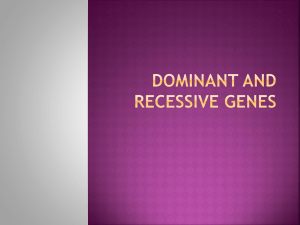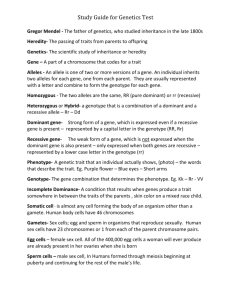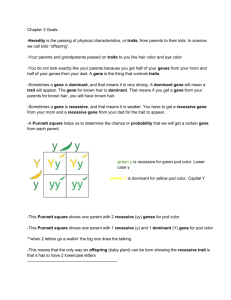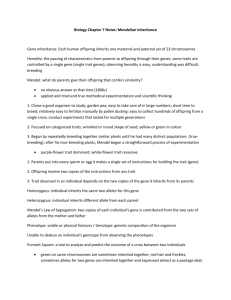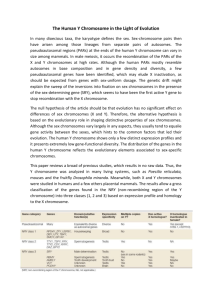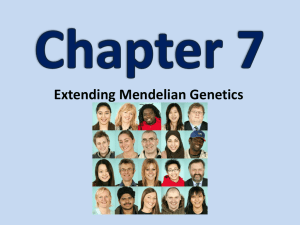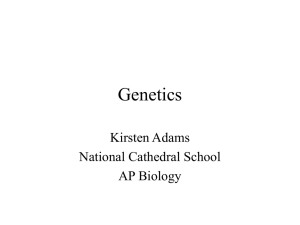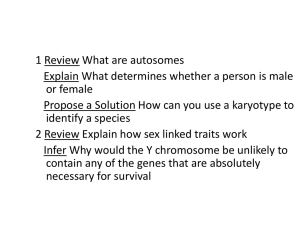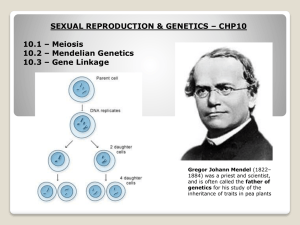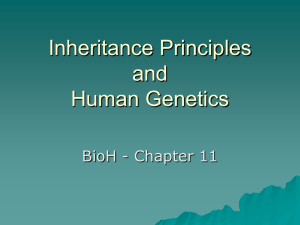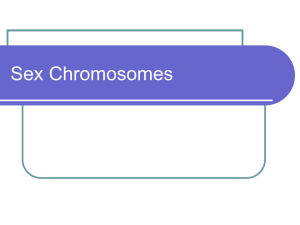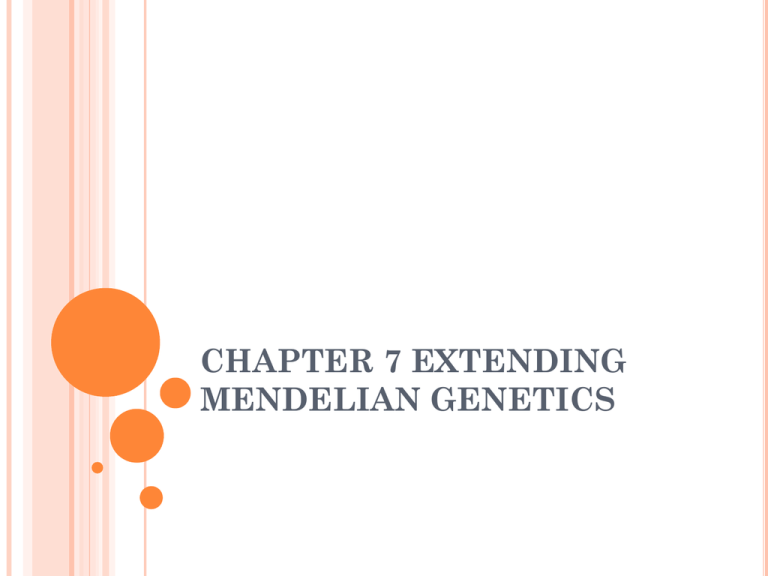
CHAPTER 7 EXTENDING
MENDELIAN GENETICS
SECTION 1 CHROMOSOMES AND
PHENOTYPES
Two copies of each autosomal gene affect
phenotype.
?
One copy comes from the Father, the other from the
mother
What cellular process forms gamete cells?
(aka haploid cells?)
Some disorders are caused by recessive
alleles.
The Heterozygous form of these conditions
are known as CARRIERS because they do
not portray the disease, but can pass it on
to the next generation.
DISORDERS CAUSED BY ALLELE
COMBINATIONS:
Recessive
Dominant
ex. Sickle Cell Anemia
ex. Huntington’s disease
Homozygous recessive
to have the
disease/disorder
The Heterozygous
form of these
conditions are known
as CARRIERS
because they do not
portray the disease,
but can pass it on to
the next generation.
less common than
recessive disorders.
Since caused by a
dominant allele, there
is a 50% chance of the
next generation
having the disease.
SEX LINKED TRAITS
Sex chromosomes = the X and Y
Females = XX, Males = XY
In X-linked traits:
women can be carriers, normal, or affected
males are either affected or not since they have only 1
X
In Y-Linked traits:
Only seen in males, and all the males in a family will
be affected from father to son.
* The X chromosome is SUPER HUGE as
compared to the Y chromosome and must be
present in either sex.
X CHROMOSOME INACTIVATION
X
chromosome is
HUGE, and in cats
controls color.
The cells randomly
turns one of the X’s
off allowing one color
to show through.
The Turned off X is
called a BARR
BODY.
This is how you get
calico cats!
PATTERNS OF INHERITANCE
REVIEW:
Incomplete dominance occurs when neither of the dominant nor the
recessive allele is masked during the
heterozygous stage.
The phenotypes seem to BLEND
Codominance both alleles of a gene are expressed completely,
neither is dominant or recessive.
Polygenic traits- ex skin color, eye color,etc
phenotype that is controled by two or more genes.
Epistasis occures when there is one gene that can
mask/ interfere with ALL the rest. Example:
Albinism
2.
What term do we use when there is
a blending of phenotypes due to the
heterozygous genotype? ex white,
pink, Red
INCOMPLETE DOMINANCE
What term is used to describe the
state where BOTH alleles are
expressed completely, where
neither is dominant or recessive?
3.
CODOMINANCE
What term is used to describe a
trait that is controlled by two or
more genes?
POLYGENIC TRAIT
POP QUIZ
1.
gene that can mask all the rest?
Epistatic gene
5. What is the term used to
describe the X chromosome that
has been turned off in female
cells?
Barr Body
6. Why are dominant trait
disorders less common in a
population than recessive trait
disorders?
Dominant trait disorders generally cause
server damage and death for the creature,
generally before it can pass on its genetic
information
POP QUIZ
4. What do we call the polygenic
can cause a person’s hair
to become lighter in color. Is this
an example of an interaction
between genes and the
environment? Why or why not?
YES! because phenotype is
altered by environment
Give an example of a trait that is
considered to be polygenic.
Eye color, skin color, etc
POP QUIZ
BONUS
Sunlight
HOME WORK
•Read
Chapter 7 sections 3 & 4 pages 209 – 217
•Screen
notes assignment: Part one
Fold your 2 pieces of notebook paper so that each
side has 6 boxes.
• Everytime you come to a BOLD BLUE or BLACK
paragraph heading you will do the following.
• In the LEFT BOX you will write the page
number and notes to sum up that section.
minimum of 12-15 words!
• In the RIGHT box you will sketch a picture to
illustrate what you wrote in the left box.
Something to help you remember it.
***You must have 8 box sets of words & pictures.
•
•Part
two: Investigation on page 219 #’s 1-4, must
show work and use COMPLETE SENTENCES!!!
GENE LINKAGE ,MAPPING,
& PEDIGREES
chapter 7 sections 3&4
THOMAS HUNT MORGAN AND HIS
FRUIT FLYS
Gene linkage was first studied by Morgan in fruit
flies because they were easy to raise and had few
characteristics to easily study.
He expected the Mendelian 9:3:3:1 ratio but his
results did not always follow that.
He observed that some of the triats seemed to be
inherited together in four groups….
we later learned that they only had four
chromosomes…
He called these genes LINKED GENES because
they were on the same chromosome, and found
out that the CHROMOSOMES not the GENES
assorted independently during meiosis.
He called these genes
LINKED GENES because
they were on the same
chromosome, and found
out that the
CHROMOSOMES not the
GENES assorted
independently during
meiosis.
He also concluded that
chromosomes must
exchange homologous
genes during meiosis…
CROSSING OVER
LINKAGE MAPS
Are used to estimate distances between genes.
The CLOSER together two genes are, the MORE
likely they will be inherited together.
The FARTHER apart two genes are, the LESS
likely they will be inherited together.
On a linkage map, one map unit is equal to one
cross-over for each 100 offspring, or one % point.
MAP CHALLENGE: USE THE DATA
BELOW TO ANSWER THE QUESTIONS
Gene A and B cross over 6.0% of the time.
Gene B and C cross over 12.5 % of the time.
Gene A and C cross over 18.5 percent of the time.
1.
2.
3.
Which two genes are closest together?
Which two genes are farthest apart?
Draw a map showing the location of each gene
and its %/ map unit distance from the next.
ex. ______A__________B__C_________
25%
2%
so A to C = 27%
PEDIGREES
Human genetics, or any mammal’s genetics
follow a set of patterns that can be easily
recorded in pedigrees.
A Pedigree is a chart that can help trace the
phenotypes and genotypes in a family for a
particular trait.
Autosomal traits are easily traced since the traits
will follow a Mendelian punnett square.
Sex linked traits leave a distinct pattern that
requires the observed to remember if the trait is
dominant or recessive, X-linked or Y linked
•squares
I
A
II
B
III
C
=
male
•circles =
females
•Half filled
means
carrier
•Filled
means
affected
Give the Genotypes for IA, IIB, and IIIC
KARYOTYPES
Are pictures of ALL the
chromosomes in a cell.
Chemical stains produce a
pattern of stains on the
chromosomes to help
identify them.
Karyotypes can be used to
show whole or partial
chromosome deletions or
additions.
Ex. Downs syndrome is
caused by an extra #21
chromosome.
HOMEWORK:
Complete the at home
investigation on page 219.
Answer ALL the Analyze and
conclude questions. (1-4)

